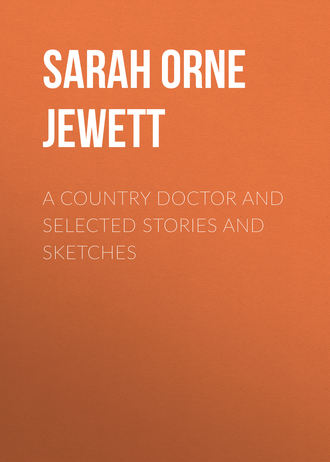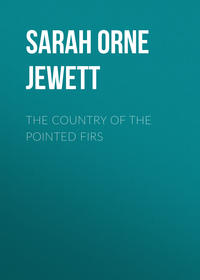 полная версия
полная версияA Country Doctor and Selected Stories and Sketches
Along this path she had hurried or faltered many a time. She remembered her grandmother's funeral, and how she had walked, with an elderly cousin whom she did not know, at the head of the procession, and had seen Martin Dyer's small grandson peeping like a rabbit from among the underbrush near the shore. Poor little Nan! she was very lonely that day. She had been so glad when the doctor had wrapped her up and taken her home.
She saw the neighborly old hawthorn-tree that grew by a cellar, and stopped to listen to its rustling and to lay her hand upon the rough bark. It had been a cause of wonder once, for she knew no other tree of the kind. It was like a snow-drift when it was in bloom, and in the grass-grown cellar she had spent many an hour, for there was a good shelter from the wind and an excellent hiding-place, though it seemed very shallow now when she looked at it as she went by.
The burying-place was shut in by a plain stone wall, which she had long ago asked the Dyers to build for her, and she leaned over it now and looked at the smooth turf of the low graves. She had always thought she would like to lie there too when her work was done. There were some of the graves which she did not know, but one was her poor young mother's, who had left her no inheritance except some traits that had won Nan many friends; all her evil gifts had been buried with her, the neighbors had said, when the girl was out of hearing, that very afternoon.
There was a strange fascination about these river uplands; no place was so dear to Nan, and yet she often thought with a shudder of the story of those footprints which had sought the river's brink, and then turned back. Perhaps, made pure and strong in a better world, in which some lingering love and faith had given her the true direction at last, where even her love for her child had saved her, the mother had been still taking care of little Nan and guiding her. Perhaps she had helped to make sure of the blessings her own life had lost, of truth and whiteness of soul and usefulness; and so had been still bringing her child in her arms toward the great shelter and home, as she had toiled in her fright and weakness that dark and miserable night toward the house on the hill.
And Nan stood on the shore while the warm wind that gently blew her hair felt almost like a hand, and presently she went closer to the river, and looked far across it and beyond it to the hills. The eagles swung to and fro above the water, but she looked beyond them into the sky. The soft air and the sunshine came close to her; the trees stood about and seemed to watch her; and suddenly she reached her hands upward in an ecstasy of life and strength and gladness. "O God," she said, "I thank thee for my future."
SELECTED STORIES AND SKETCHES
A Winter Courtship
The passenger and mail transportation between the towns of North Kilby and Sanscrit Pond was carried on by Mr. Jefferson Briley, whose two-seated covered wagon was usually much too large for the demands of business. Both the Sanscrit Pond and North Kilby people were stayers-at-home, and Mr. Briley often made his seven-mile journey in entire solitude, except for the limp leather mail-bag, which he held firmly to the floor of the carriage with his heavily shod left foot. The mail-bag had almost a personality to him, born of long association. Mr. Briley was a meek and timid-looking body, but he held a warlike soul, and encouraged his fancies by reading awful tales of bloodshed and lawlessness in the far West. Mindful of stage robberies and train thieves, and of express messengers who died at their posts, he was prepared for anything; and although he had trusted to his own strength and bravery these many years, he carried a heavy pistol under his front-seat cushion for better defense. This awful weapon was familiar to all his regular passengers, and was usually shown to strangers by the time two of the seven miles of Mr. Briley's route had been passed. The pistol was not loaded. Nobody (at least not Mr. Briley himself) doubted that the mere sight of such a weapon would turn the boldest adventurer aside.
Protected by such a man and such a piece of armament, one gray Friday morning in the edge of winter, Mrs. Fanny Tobin was traveling from Sanscrit Pond to North Kilby. She was an elderly and feeble-looking woman, but with a shrewd twinkle in her eyes, and she felt very anxious about her numerous pieces of baggage and her own personal safety. She was enveloped in many shawls and smaller wrappings, but they were not securely fastened, and kept getting undone and flying loose, so that the bitter December cold seemed to be picking a lock now and then, and creeping in to steal away the little warmth she had. Mr. Briley was cold, too, and could only cheer himself by remembering the valor of those pony-express drivers of the pre-railroad days, who had to cross the Rocky Mountains on the great California route. He spoke at length of their perils to the suffering passenger, who felt none the warmer, and at last gave a groan of weariness.
"How fur did you say 't was now?"
"I do' know's I said, Mis' Tobin," answered the driver, with a frosty laugh. "You see them big pines, and the side of a barn just this way, with them yellow circus bills? That's my three-mile mark."
"Be we got four more to make? Oh, my laws!" mourned Mrs. Tobin. "Urge the beast, can't ye, Jeff'son? I ain't used to bein' out in such bleak weather. Seems if I couldn't git my breath. I'm all pinched up and wigglin' with shivers now. 'T ain't no use lettin' the hoss go step-a-ty-step, this fashion."
"Landy me!" exclaimed the affronted driver. "I don't see why folks expects me to race with the cars. Everybody that gits in wants me to run the hoss to death on the road. I make a good everage o' time, and that's all I can do. Ef you was to go back an' forth every day but Sabbath fur eighteen years, you'd want to ease it all you could, and let those thrash the spokes out o' their wheels that wanted to. North Kilby, Mondays, Wednesdays, and Fridays; Sanscrit Pond, Tuesdays, Thu'sdays, an' Saturdays. Me an' the beast's done it eighteen years together, and the creatur' warn't, so to say, young when we begun it, nor I neither. I re'lly didn't know's she'd hold out till this time. There, git up, will ye, old mar'!" as the beast of burden stopped short in the road.
There was a story that Jefferson gave this faithful creature a rest three times a mile, and took four hours for the journey by himself, and longer whenever he had a passenger. But in pleasant weather the road was delightful, and full of people who drove their own conveyances, and liked to stop and talk. There were not many farms, and the third growth of white pines made a pleasant shade, though Jefferson liked to say that when he began to carry the mail his way lay through an open country of stumps and sparse underbrush, where the white pines nowadays completely arched the road.
They had passed the barn with circus posters, and felt colder than ever when they caught sight of the weather-beaten acrobats in their tights.
"My gorry!" exclaimed Widow Tobin, "them pore creatur's looks as cheerless as little birch-trees in snow-time. I hope they dresses 'em warmer this time o' year. Now, there! look at that one jumpin' through the little hoop, will ye?"
"He couldn't git himself through there with two pair o' pants on," answered Mr. Briley. "I expect they must have to keep limber as eels. I used to think, when I was a boy, that 'twas the only thing I could ever be reconciled to do for a livin'. I set out to run away an' follow a rovin' showman once, but mother needed me to home. There warn't nobody but me an' the little gals."
"You ain't the only one that's be'n disapp'inted o' their heart's desire," said Mrs. Tobin sadly. "'T warn't so that I could be spared from home to learn the dressmaker's trade."
"'T would a come handy later on, I declare," answered the sympathetic driver, "bein' 's you went an' had such a passel o' gals to clothe an' feed. There, them that's livin' is all well off now, but it must ha' been some inconvenient for ye when they was small."
"Yes, Mr. Briley, but then I've had my mercies, too," said the widow somewhat grudgingly. "I take it master hard now, though, havin' to give up my own home and live round from place to place, if they be my own child'en. There was Ad'line and Susan Ellen fussin' an' bickerin' yesterday about who'd got to have me next; and, Lord be thanked, they both wanted me right off but I hated to hear 'em talkin' of it over. I'd rather live to home, and do for myself."
"I've got consider'ble used to boardin'," said Jefferson, "sence ma'am died, but it made me ache 'long at the fust on 't, I tell ye. Bein' on the road's I be, I couldn't do no ways at keepin' house. I should want to keep right there and see to things."
"Course you would," replied Mrs. Tobin, with a sudden inspiration of opportunity which sent a welcome glow all over her. "Course you would, Jeff'son,"—she leaned toward the front seat; "that is to say, onless you had jest the right one to do it for ye."
And Jefferson felt a strange glow also, and a sense of unexpected interest and enjoyment.
"See here, Sister Tobin," he exclaimed with enthusiasm. "Why can't ye take the trouble to shift seats, and come front here long o' me? We could put one buff'lo top o' the other,—they're both wearin' thin,—and set close, and I do' know but we sh'd be more protected ag'inst the weather."
"Well, I couldn't be no colder if I was froze to death," answered the widow, with an amiable simper. "Don't ye let me delay you, nor put you out, Mr. Briley. I don't know's I'd set forth to-day if I'd known 't was so cold; but I had all my bundles done up, and I ain't one that puts my hand to the plough an' looks back, 'cordin' to Scriptur'."
"You wouldn't wanted me to ride all them seven miles alone?" asked the gallant Briley sentimentally, as he lifted her down, and helped her up again to the front seat. She was a few years older than he, but they had been schoolmates, and Mrs. Tobin's youthful freshness was suddenly revived to his mind's eye. She had a little farm; there was nobody left at home now but herself, and so she had broken up housekeeping for the winter. Jefferson himself had savings of no mean amount.
They tucked themselves in, and felt better for the change, but there was a sudden awkwardness between them; they had not had time to prepare for an unexpected crisis.
"They say Elder Bickers, over to East Sanscrit, 's been and got married again to a gal that's four year younger than his oldest daughter," proclaimed Mrs. Tobin presently. "Seems to me 't was fool's business."
"I view it so," said the stage-driver. "There's goin' to be a mild open winter for that fam'ly."
"What a joker you be for a man that's had so much responsibility!" smiled Mrs. Tobin, after they had done laughing. "Ain't you never 'fraid, carryin' mail matter and such valuable stuff, that you'll be set on an' robbed, 'specially by night?"
Jefferson braced his feet against the dasher under the worn buffalo skin. "It is kind o' scary, or would be for some folks, but I'd like to see anybody get the better o' me. I go armed, and I don't care who knows it. Some o' them drover men that comes from Canady looks as if they didn't care what they did, but I look 'em right in the eye every time."
"Men folks is brave by natur'," said the widow admiringly. "You know how Tobin would let his fist right out at anybody that undertook to sass him. Town-meetin' days, if he got disappointed about the way things went, he'd lay 'em out in win'rows; and ef he hadn't been a church-member he'd been a real fightin' character. I was always 'fraid to have him roused, for all he was so willin' and meechin' to home, and set round clever as anybody. My Susan Ellen used to boss him same's the kitten, when she was four year old."
"I've got a kind of a sideways cant to my nose, that Tobin give me when we was to school. I don't know's you ever noticed it," said Mr. Briley. "We was scufflin', as lads will. I never bore him no kind of a grudge. I pitied ye, when he was taken away. I re'lly did, now, Fanny. I liked Tobin first-rate, and I liked you. I used to say you was the han'somest girl to school."
"Lemme see your nose. 'Tis all straight, for what I know," said the widow gently, as with a trace of coyness she gave a hasty glance. "I don't know but what 'tis warped a little, but nothin' to speak of. You've got real nice features, like your marm's folks."
It was becoming a sentimental occasion, and Jefferson Briley felt that he was in for something more than he had bargained. He hurried the faltering sorrel horse, and began to talk of the weather. It certainly did look like snow, and he was tired of bumping over the frozen road.
"I shouldn't wonder if I hired a hand here another year, and went off out West myself to see the country."
"Why, how you talk!" answered the widow.
"Yes'm," pursued Jefferson. "'Tis tamer here than I like, and I was tellin' 'em yesterday I've got to know this road most too well. I'd like to go out an' ride in the mountains with some o' them great clipper coaches, where the driver don't know one minute but he'll be shot dead the next. They carry an awful sight o' gold down from the mines, I expect."
"I should be scairt to death," said Mrs. Tobin. "What creatur's men folks be to like such things! Well, I do declare."
"Yes," explained the mild little man. "There's sights of desp'radoes makes a han'some livin' out o' followin' them coaches, an' stoppin' an' robbin' 'em clean to the bone. Your money or your life!" and he flourished his stub of a whip over the sorrel mare.
"Landy me! you make me run all of a cold creep. Do tell somethin' heartenin', this cold day. I shall dream bad dreams all night."
"They put on black crape over their heads," said the driver mysteriously. "Nobody knows who most on 'em be, and like as not some o' them fellows come o' good families. They've got so they stop the cars, and go right through 'em bold as brass. I could make your hair stand on end, Mis' Tobin,—I could so!"
"I hope none on 'em'll git round our way, I'm sure," said Fanny Tobin. "I don't want to see none on 'em in their crape bunnits comin' after me."
"I ain't goin' to let nobody touch a hair o' your head," and Mr. Briley moved a little nearer, and tucked in the buffaloes again.
"I feel considerable warm to what I did," observed the widow by way of reward.
"There, I used to have my fears," Mr. Briley resumed, with an inward feeling that he never would get to North Kilby depot a single man. "But you see I hadn't nobody but myself to think of. I've got cousins, as you know, but nothin' nearer, and what I've laid up would soon be parted out; and—well, I suppose some folks would think o' me if anything was to happen."
Mrs. Tobin was holding her cloud over her face,—the wind was sharp on that bit of open road,—but she gave an encouraging sound, between a groan and a chirp.
"'T wouldn't be like nothin' to me not to see you drivin' by," she said, after a minute. "I shouldn't know the days o' the week. I says to Susan Ellen last week I was sure 'twas Friday, and she said no, 'twas Thursday; but next minute you druv by and headin' toward North Kilby, so we found I was right."
"I've got to be a featur' of the landscape," said Mr. Briley plaintively. "This kind o' weather the old mare and me, we wish we was done with it, and could settle down kind o' comfortable. I've been lookin' this good while, as I drove the road, and I've picked me out a piece o' land two or three times. But I can't abide the thought o' buildin',—'twould plague me to death; and both Sister Peak to North Kilby and Mis' Deacon Ash to the Pond, they vie with one another to do well by me, fear I'll like the other stoppin'-place best."
"I shouldn't covet livin' long o' neither one o' them women," responded the passenger with some spirit. "I see some o' Mis' Peak's cookin' to a farmers' supper once, when I was visitin' Susan Ellen's folks, an' I says 'Deliver me from sech pale-complected baked beans as them!' and she give a kind of a quack. She was settin' jest at my left hand, and couldn't help hearin' of me. I wouldn't have spoken if I had known, but she needn't have let on they was hers an' make everything unpleasant. 'I guess them beans taste just as well as other folks',' says she, and she wouldn't never speak to me afterward."
"Do' know's I blame her," ventured Mr. Briley. "Women folks is dreadful pudjicky about their cookin'. I've always heard you was one o' the best o' cooks, Mis' Tobin. I know them doughnuts an' things you've give me in times past, when I was drivin' by. Wish I had some on 'em now. I never let on, but Mis' Ash's cookin's the best by a long chalk. Mis' Peak's handy about some things, and looks after mendin' of me up."
"It doos seem as if a man o' your years and your quiet make ought to have a home you could call your own," suggested the passenger. "I kind of hate to think o' your bangein' here and boardin' there, and one old woman mendin', and the other settin' ye down to meals that like's not don't agree with ye."
"Lor', now, Mis' Tobin, le's not fuss round no longer," said Mr. Briley impatiently. "You know you covet me same's I do you."
"I don't nuther. Don't you go an' say fo'lish things you can't stand to."
"I've been tryin' to git a chance to put in a word with you ever sence—Well, I expected you'd want to get your feelin's kind o' calloused after losin' Tobin."
"There's nobody can fill his place," said the widow.
"I do' know but I can fight for ye town-meetin' days, on a pinch," urged Jefferson boldly.
"I never see the beat o' you men fur conceit," and Mrs. Tobin laughed. "I ain't goin' to bother with ye, gone half the time as you be, an' carryin' on with your Mis' Peaks and Mis' Ashes. I dare say you've promised yourself to both on 'em twenty times."
"I hope to gracious if I ever breathed a word to none on 'em!" protested the lover. "'T ain't for lack o' opportunities set afore me, nuther;" and then Mr. Briley craftily kept silence, as if he had made a fair proposal, and expected a definite reply.
The lady of his choice was, as she might have expressed it, much beat about. As she soberly thought, she was getting along in years, and must put up with Jefferson all the rest of the time. It was not likely she would ever have the chance of choosing again, though she was one who liked variety.
Jefferson wasn't much to look at, but he was pleasant and appeared boyish and young-feeling. "I do' know's I should do better," she said unconsciously and half aloud. "Well, yes, Jefferson, seein' it's you. But we're both on us kind of old to change our situation." Fanny Tobin gave a gentle sigh.
"Hooray!" said Jefferson. "I was scairt you meant to keep me sufferin' here a half an hour. I declare, I'm more pleased than I calc'lated on. An' I expected till lately to die a single man!"
"'Twould re'lly have been a shame; 'tain't natur'," said Mrs. Tobin, with confidence. "I don't see how you held out so long with bein' solitary."
"I'll hire a hand to drive for me, and we'll have a good comfortable winter, me an' you an' the old sorrel. I've been promisin' of her a rest this good while."
"Better keep her a steppin'," urged thrifty Mrs. Fanny. "She'll stiffen up master, an' disapp'int ye, come spring."
"You'll have me, now, won't ye, sartin?" pleaded Jefferson, to make sure. "You ain't one o' them that plays with a man's feelin's. Say right out you'll have me."
"I s'pose I shall have to," said Mrs. Tobin somewhat mournfully. "I feel for Mis' Peak an' Mis' Ash, pore creatur's. I expect they'll be hardshipped. They've always been hard-worked, an' may have kind o' looked forward to a little ease. But one on 'em would be left lamentin', anyhow," and she gave a girlish laugh. An air of victory animated the frame of Mrs. Tobin. She felt but twenty-five years of age. In that moment she made plans for cutting her Briley's hair, and making him look smartened-up and ambitious. Then she wished that she knew for certain how much money he had in the bank; not that it would make any difference now. "He needn't bluster none before me," she thought gayly. "He's harmless as a fly."
"Who'd have thought we'd done such a piece of engineerin', when we started out?" inquired the dear one of Mr. Briley's heart, as he tenderly helped her to alight at Susan Ellen's door.
"Both on us, jest the least grain," answered the lover. "Gimme a good smack, now, you clever creatur';" and so they parted. Mr. Bailey had been taken on the road in spite of his pistol.
Going to Shrewsbury
The train stopped at a way station with apparent unwillingness, and there was barely time for one elderly passenger to be hurried on board before a sudden jerk threw her almost off her unsteady old feet and we moved on. At my first glance I saw only a perturbed old countrywoman, laden with a large basket and a heavy bundle tied up in an old-fashioned bundle-handkerchief; then I discovered that she was a friend of mine, Mrs. Peet, who lived on a small farm, several miles from the village. She used to be renowned for good butter and fresh eggs and the earliest cowslip greens; in fact, she always made the most of her farm's slender resources; but it was some time since I had seen her drive by from market in her ancient thorough-braced wagon.
The brakeman followed her into the crowded car, also carrying a number of packages. I leaned forward and asked Mrs. Peet to sit by me; it was a great pleasure to see her again. The brakeman seemed relieved, and smiled as he tried to put part of his burden into the rack overhead; but even the flowered carpet-bag was much too large, and he explained that he would take care of everything at the end of the car. Mrs. Peet was not large herself, but with the big basket, and the bundle-handkerchief, and some possessions of my own we had very little spare room.
"So this 'ere is what you call ridin' in the cars! Well, I do declare!" said my friend, as soon as she had recovered herself a little. She looked pale and as if she had been in tears, but there was the familiar gleam of good humor in her tired old eyes.
"Where in the world are you going, Mrs. Peet?" I asked.
"Can't be you ain't heared about me, dear?" said she. "Well, the world's bigger than I used to think 't was. I've broke up,—'twas the only thing to do,—and I'm a-movin' to Shrewsbury."
"To Shrewsbury? Have you sold the farm?" I exclaimed, with sorrow and surprise. Mrs. Peet was too old and too characteristic to be suddenly transplanted from her native soil. "'T wa'n't mine, the place wa'n't." Her pleasant face hardened slightly. "He was coaxed an' over-persuaded into signin' off before he was taken away. Is'iah, son of his sister that married old Josh Peet, come it over him about his bein' past work and how he'd do for him like an own son, an' we owed him a little somethin'. I'd paid off everythin' but that, an' was fool enough to leave it till the last, on account o' Is'iah's bein' a relation and not needin' his pay much as some others did. It's hurt me to have the place fall into other hands. Some wanted me to go right to law; but 't wouldn't be no use. Is'iah's smarter 'n I be about them matters. You see he's got my name on the paper, too; he said 't was somethin' 'bout bein' responsible for the taxes. We was scant o' money, an' I was wore out with watchin' an' being broke o' my rest. After my tryin' hard for risin' forty-five year to provide for bein' past work, here I be, dear, here I be! I used to drive things smart, you remember. But we was fools enough in '72 to put about everythin' we had safe in the bank into that spool factory that come to nothin'. But I tell ye I could ha' kept myself long's I lived, if I could ha' held the place. I'd parted with most o' the woodland, if Is'iah'd coveted it. He was welcome to that, 'cept what might keep me in oven-wood. I've always desired to travel an' see somethin' o' the world, but I've got the chance now when I don't value it no great."
"Shrewsbury is a busy, pleasant place," I ventured to say by way of comfort, though my heart was filled with rage at the trickery of Isaiah Peet, who had always looked like a fox and behaved like one.
"Shrewsbury's be'n held up consid'able for me to smile at," said the poor old soul, "but I tell ye, dear, it's hard to go an' live twenty-two miles from where you've always had your home and friends. It may divert me, but it won't be home. You might as well set out one o' my old apple-trees on the beach, so 't could see the waves come in,—there wouldn't be no please to it."






